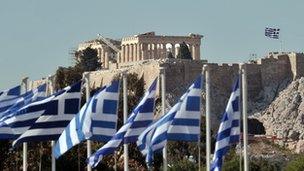Eurozone finance ministers fail to agree Greece bailout
- Published

Eurozone finance ministers have failed to reach a deal to give Greece the next tranche of its financial bailout.
Following nearly 12 hours of talks in Brussels the Eurogroup said it had made progress on a package of measures to reduce Greek public debt, but needed more time for technical work.
The chairman of the Eurogroup Jean-Claude Juncker said they would meet again on Monday.
Greece needs the next tranche of its bailout to avoid insolvency.
The eurozone finance ministers have been considering ways of reducing Greece's public debt, which is projected to rise to 189% of gross domestic product, GDP, by next year.
The country's bailout programme aims to get debt down to 120% of GDP by 2020.
"The Eurogroup has had an extensive discussion and made progress in identifying a consistent package of credible initiatives aimed at making a further substantial contribution to the sustainability of Greek government debt," Jean-Claude Juncker said in a statement.
Disagreement
There has been disagreement among the ministers and the International Monetary Fund, Greece's other bailout creditor, on how to make the country's debt manageable.
Schroders economist Virginie Maisonneuve: "Clearly we'll have more negotiation"
The eurozone ministers favour giving Greece an extra two years, to 2022, to bring its debt to 120% of GDP, but the IMF has resisted that extension.
Although the meeting wrapped up in the early hours of Wednesday morning in Brussels without a conclusion, earlier on Tuesday night there had been optimism a deal would be reached.
The French finance minister Pierre Moscovici said: "I have the impression that a political agreement is within reach."
The managing director of the IMF, Christine Lagarde, insisted: "We're going to work very constructively to see if we can find a solution for Greece. That's what really is our goal, our purpose and our mission."
So far, Greece has received nearly 149bn euros (£119bn; $191bn) from the eurozone and the International Monetary Fund, out of 240bn euros that has been approved in two bailout loans.
- Published13 November 2012
- Published12 November 2012